Launch event: Women and Customary and Informal Justice Systems
WEBINAR - PANEL DISCUSSION | 10 September 2020 | 14:00 – 16:00 CET
Customary and Informal Justice Systems: Expanding Women’s Access to Justice and Gender Equality


Customary and informal justice (CIJ) describes justice and conflict resolution mechanisms that operate outside the formal system of state-based laws and courts. CIJ encompasses a range of solutions from traditional and indigenous systems to local alternative dispute resolution. CIJ systems are often more cost effective, accessible, and trusted compared to formal systems; they tend to emphasize restorative justice, flexible rules and procedures, and negotiated solutions that are culturally resonant. At the same time, some CIJ practices are inconsistent with international human rights standards and reflect unequal power dynamics and conservative social norms, with adverse effects on women and other excluded groups.
IDLO is committed to engaging with the diverse pathways available to justice seekers, especially women and other excluded groups, strengthening the accessibility, responsiveness and accountability of CIJ providers, and ensuring that these cooperate with formal justice systems. We seek to promote innovative approaches, generate knowledge and influence policy in ways that centre CIJ in the global justice agenda.
IDLO has taken a leadership role in the global Working Group on CIJ and Sustainable Development Goal (SDG) 16+, a unique coalition that includes a broad array of actors, from UN and other intergovernmental agencies to grassroots justice defenders and community groups, and advocates for the centrality of diverse pathways to justice in achieving SDG 16. In 2023, the Working Group published Diverse Pathways to People-Centred Justice, a landmark report articulating a new consensus on the need to engage with CIJ actors and practices in efforts to enhance access to justice and strengthen the rule of law. It will serve as a basis for further multi-stakeholder collaboration on CIJ policy and programming at the global level in the years ahead.
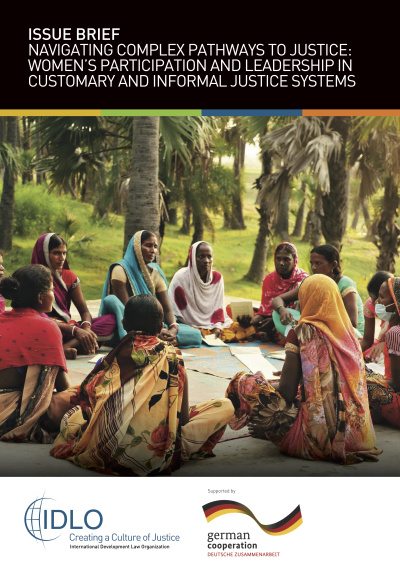
Issue Brief: Women’s Participation and Leadership in Customary and Informal Justice Systems
The majority of justice seekers worldwide resolve their problems through customary and informal justice (CIJ) systems. Women constitute the largest group of users of CIJ systems for diverse reasons and rely on them for resolution of their justice problems.
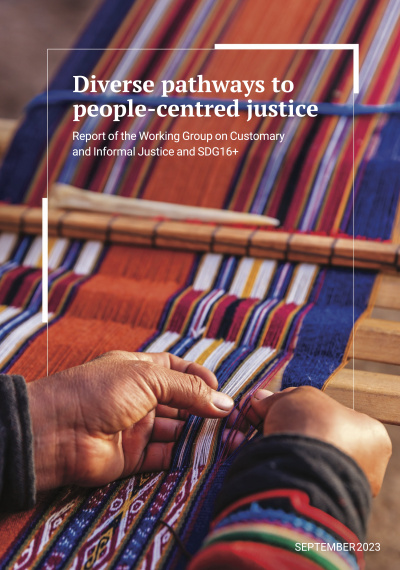
Diverse Pathways to People-Centred Justice
Globally, most people do not resort to formal justice systems to address their justice problems. Rather, they rely on diverse pathways to justice often referred to collectively as “customary and informal justice” (CIJ).
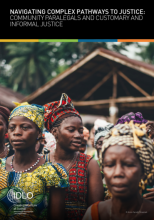
Community Paralegals and Customary and Informal Justice
Community Paralegals and Customary and Informal Justice explores how community-based paralegals and other legal aid providers can strengthen the accessibility and inclusiveness of customary and informal justice (CIJ) systems.
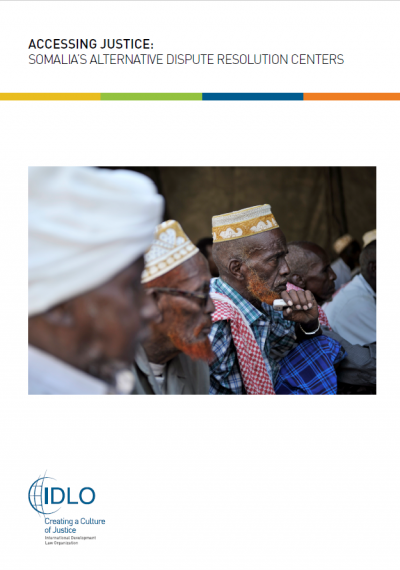
Accessing Justice: Somalia's Alternative Dispute Resolution Centers
Accessing Justice: Somalia's Alternative Dispute Resolution Centers reviews structural, procedural, and normative dimensions of justice in six Alternative Dispute Resolution (ADR) Centers in Somalia, documenting insights from ADR Coordinators, Clerks, paralegals, and Adjudicators as well as users of the Centers.
View more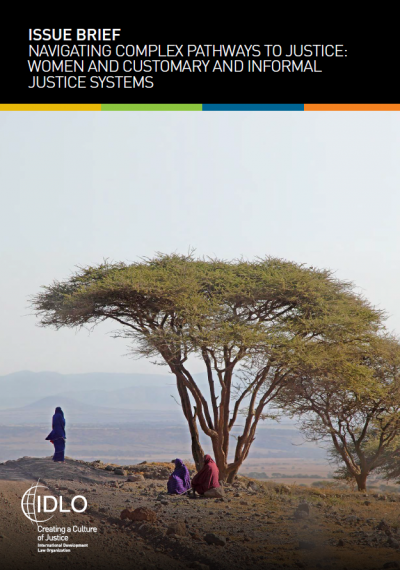
Issue Brief: Women and Customary and Informal Justice Systems
Women and Customary and Informal Justice Systems focuses on the relationship between women and customary and informal justice (CIJ) systems.
View more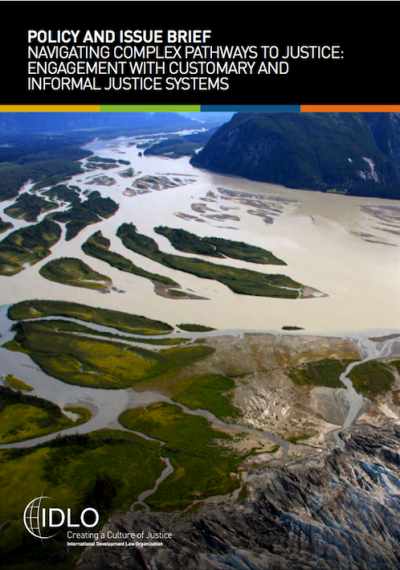
Policy and Issue Brief: Engagement with Customary and Informal Justice Systems
In a bid to make justice accessible for all, IDLO has launched a series of Consultations on customary and informal justice systems. The global dialogue is informed by a series of publications titled “Navigating Complex Pathways to Justice: Engagement with Customary and Informal Justice Systems” that seeks to advance policy dialogue and distil lessons from programming and research, to help realize Sustainable Development Goal 16.
View more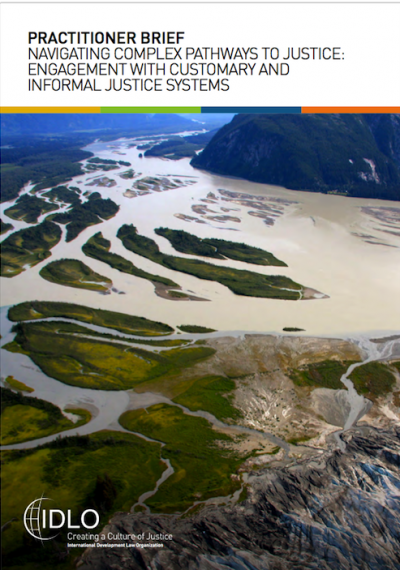
Practitioner Brief: Engagement with Customary and Informal Justice Systems
In a bid to make justice accessible for all, IDLO has launched a series of Consultations on customary and informal justice systems. The global dialogue is informed by a series of publications titled “Navigating Complex Pathways to Justice: Engagement with Customary and Informal Justice Systems” that seeks to advance policy dialogue and distil lessons from programming and research, to help realize Sustainable Development Goal 16. This Practitioner Brief offers a set of concrete tools, recommendations and good practices to support engagement with customary and informal justice systems.
WEBINAR - PANEL DISCUSSION | 10 September 2020 | 14:00 – 16:00 CET
Customary and Informal Justice Systems: Expanding Women’s Access to Justice and Gender Equality

IDLO is rolling out a program that aims to secure accessible, quality and sustainable justice services for citizens - particularly those living in rural, poor and other disadvantaged communities. The Community Justice Programme (CJP) supports both state and non-state legal aid, legal empowerment and other justice delivery interventions.
Amina*, a mother of two from Mogadishu, found herself in a difficult position: her husband left five years ago to live abroad and never returned. Already living in poor conditions, she struggled to feed herself and her family.

The private sector is of central importance for The Gambia, a Least Developed Country where the availability of private capital from foreign and domestic investors is critical to promote sustainable economic growth, increase employment and ensure better living conditions.
African high-level jurists, experts and legal scholars are meeting in Nairobi for the East Africa Regional Forum on Alternative Dispute Resolution &

SIDE EVENT Women and Customary and Informal Justice Systems: Engagement and Action
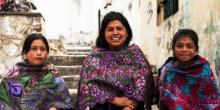
East Africa Regional Forum - Alternative Dispute Resolution & Customary and Informal Justice: Advancing SDG16 and Pathways to Justice
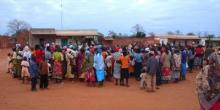
In 2020, the global community will mark the twenty-fifth anniversary of the Fourth World Conference on Women and adoption of the Beijing Declaration and Platform for Action (1995).

The failure of criminal justice systems in the Sahel to deliver better quality justice can be linked to a series of interconnected factors, such as: the overwhelming lack of human, material and financial capacity; corruption and weak internal control mechanisms; and limitations on civil society to ensure respect for human rights.





|
Policy Statements
|
|
Évènement
5 décembre, 2023 |
|
Highlight
|